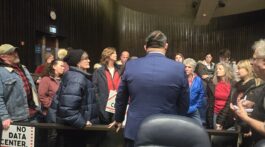by Abdul-Hakim Shabazz, Esq.
Let’s say you needed to borrow $100 from me, and you’d give me my money back tomorrow. I told you, yes, but you could only do it if you paid me back $101. You’d probably say sure. Paying $1 to get the $100 you need; no big deal, right? Well, guess what, when you pay me back that dollar, you are fundamentally paying me back with at a 365% APR. Say what? Yup. Now let’s say I was the bank and you wrote a bad check for $100 (yes, people still write checks), and I charged you a $35 overdraft fee. Guess what, you just paid me a 135 percent increase over the original amount. Why am I playing ECON 101? Because I think when it comes to what some have labeled as “payday” loan legislation, we need to take a step back from the histrionics and have a grown-up conversation.
The legislation, HB 1319, would allow these lenders to offer small installment loans for these folks of limited means who don’t use banks and credit unions the way we do. Now save your “payday loan” outrage, because I’m not a fan of them either, but I do think there needs to be a way for these folks to get access to credit because I doubt if you’re going to see them at the drive-thru window of the credit union.
HB 1319 would allow low-income Hoosiers to borrow between $605 and $1500. It limits fees and interest charged. There’s an origination fee of 15% on the first $605 and 7.5% on any additional balance. There’s a monthly maintenance fee of $8 per $100 of original principal every month, which can be refunded under certain circumstances. There are no balloon payments or prepayment penalties. Payments are amortized. And it helps those Hoosiers build credit by supporting financial literacy programs offered through the Secretary of State’s Office. This isn’t the old “payday loan” scam where you’re basically mortgaging everything but your first and second born, but they can be used as collateral.
It’s easy for folks like us to be morally outraged over financial agreements like this, but remember, we don’t live in that world. Last year, I interviewed with a local community activist who has an Internet-based television show. We taped at a studio at 38th and High School Road on Indianapolis’ far west side. If you’ve ever been there, and odds are if you’re reading this you haven’t, the studio was located in a strip mall that was full of places that most of us would likely never go. I stopped by there recently, and not much had changed, the inside was half finished, there were still bars protecting shops. I would never shop there, but as I was reminded that for a lot of those folks, that “mall” was and still is their livelihood. I would not buy clothes there, get a haircut, or anything else from there. It has not, nor will it be my world, but it is theirs, and they are entitled to be as happy in their world as we are in ours.
If you limit access to credit and capital, I could argue you are fundamentally no better than the predatory payday loan lender. And if you drive this industry out of business, you’re going to end up with something much worse, an unregulated online industry that does no one any favors and will be much more difficult to get under control. And I don’t think anyone wants that outcome.
As I have said in the past, It’s easy to see the “outrage” from folks like us who live in a world where we have easy access to banks, credit unions, and other financial institutions. Or to go further, most of us keep a few grand the bank or a few bucks around the house in case of emergency, but that’s the world where we reside. We don’t live in the world where people genuinely are living paycheck to paycheck and need access to capital when real life throws them an inside curveball. They deserve a chance, just like the rest of us.
Abdul is the editor and publisher of IndyPolitics.Org. He is also a licensed attorney in Indiana and Illinois. His opinions are his own and you are welcome to agree with him.














